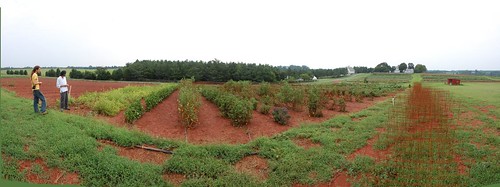Organic agriculture - new research and studies

http://www.lobbywatch.org/archive2.asp?arcid=8923
NOTE: This report has such a good summary that we've extracted it here - full report follows.
EXTRACT: Summary
Organic food is healthier than conventional food a. Organic food contains more nutrients and vitamins and minerals than conventional food b. Organic food does not contain pesticide residues found in conventional food.
Organic farming protects the environment:
a. Organic farming does not pollute air, water and land with chemical fertilisers and pesticides.
b. Organic farming helps reduce global warming because its methods use animal manure and cover crops like clover and legumes to enrich the soil which helps sequester CO2 from the atmosphere.
c. Organic farming helps reduce global warming because it uses less energy than conventional farming
Organic farming provides economic advantages a. Organic food attracts price premiums of up to 30% b. In developed countries, well managed organic farms produce crop yields which almost match those of conventional yields.
c. In under developed countries organic crop yields produce yields 2-3 times higher than conventional crops.
d. Organic farming is a cheaper method of food production because it does not use expensive chemical inputs (synthetic fertilisers and pesticides) and because it reduces the use of medicines in animal husbandry.
e. Organic farming may produce profits for farmers from ‘carbon credit’ trading systems being developed around the world f. Organic agriculture can help feed the hungry by reducing the need to import subsidised food, and could produce a diverse range of certified organic surpluses to be exported at premium profit. Because organic methods exclude the use chemical inputs, poor farmers have less capital outlay and dependency on multinational seed and chemical companies is reduced.

Etiquetas: Alternativas, Organic

<< Página Principal